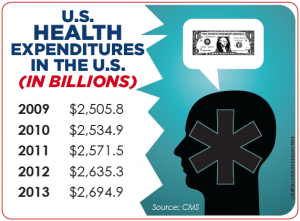Dr. Edelstein, playing devil’s advocate, said the main criticism is that it’s thought that fee for service is high cost and high volume but not high value. “We have a poor life expectancy in the United States amongst all the developed nations, and high infant mortality. And the question is ‘Why?’”
Explore This Issue
March 2015Dr. Setzen said life expectancy and infant mortality might not be the best indicators of the quality of a health system. For example, in the U.S., physicians take on high-risk pregnancies that might end with the death of the infant shortly after birth, whereas in another country the fetus may die in utero and be stillborn, and this does not affect their infant mortality statistics. Similarly, life expectancy statistics are flawed, he said.
Outliers
The panelists spent a fair amount of time talking about physicians who abuse the system by billing for work not performed. They agreed that these physicians might be “outliers,” but they do exist and help tarnish the reputation of the entire medical field.

Susan Cordes, MD
Dr. Cordes said that such physicians account for just a small percentage of medical professionals and she doesn’t think that healthcare costs will significantly decrease if fee for service is eliminated. Most tests and procedures are needed for good healthcare, she said, and physicians would still want to take good care of patients, with or without a fee for service system.
This was a point that drew passionate remarks from the audience.
Mark Persky, MD, director of the head and neck center at New York University Langone Medical Center, said the panel was “biased” and that it would be worthwhile to bring other voices outside the physician world into the conversation. He also challenged his colleagues to confront physicians who abuse the fee-for-service system.
Stilianos Kountakis, MD, PhD, chair of otolaryngology-head and neck surgery at Georgia Regents University, said that might not be such a straightforward proposition. “Medicine is not an exact science. It’s an art. There are different options,” he said. “So I think if we keep going on saying our communities are filled with physicians who abuse insurance companies and patients, without bringing up specific methods or ways to handle that, I think it doesn’t lead to anything good.”
Dr. Edelstein disagreed with the notion held by some outside the physician world that fixing healthcare is a matter of collecting more data to determine the care with the best value, and that policy could simply be changed based on that data. “The assumption that somewhere there’s data that physicians are hiding is just a ridiculous concept,” he said.
